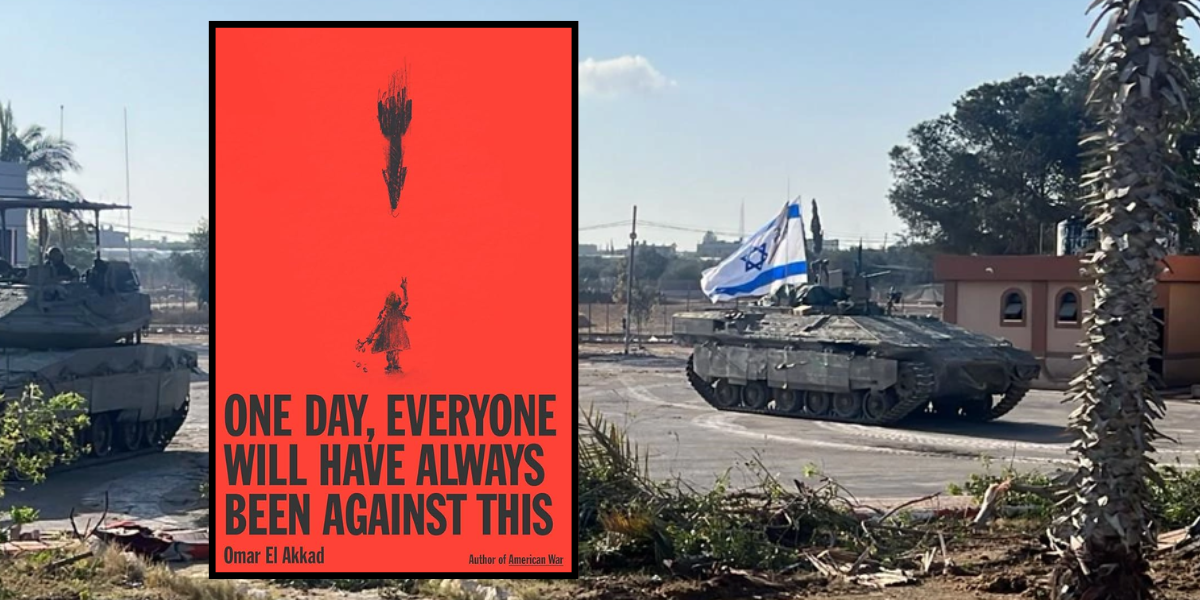One Day, Everyone Will Always Have Been Against This by Omar El Akkad (McClelland & Stewart, 2025).
Omar El Akkad’s latest book, One Day, Everyone Will Always Have Been Against This, articulates the emptiness, anguish, and contradictions many of us have experienced while witnessing our governments’ complicity and even justification for the genocide in Gaza. The liberal establishment’s silence and inaction is appalling, but as El Akkad argues, it is not out of character.
Over the past 18 months, this ongoing genocide has claimed over 50,000 lives, with many others unaccounted for, disappeared, or trapped under rubble. These numbers add to the unimaginable horrors, losses, and atrocities endured by those who have survived. What we have collectively learned is that if our liberal institutions and well-meaning colleagues and neighbors can remain silent in the face of such atrocities, then no crime will be too great to ignore. Anything can be—and has been—normalized. El Akkad argues that Western liberalism’s moral collapse is not a sudden failure, but an exposure of its long-standing contradictions. He describes a “cascade of institutional gutlessness” in the arts, media, and political establishment.
Drawing on his experiences as a journalist reporting from Afghanistan and Guantanamo Bay, and as an immigrant growing up in Qatar and then Canada, El Akkad exposes how certain lives are deemed dispensable, invisible, and even cheap. Much of the book revolves around the absence of words to adequately describe the callousness of our political class, who normalize and fictionalize atrocities in Gaza like they have done many times before and will continue to do so to pursue their interests. El Akkad argues that one day, these same liberals will offer empty condemnations and land acknowledgements—only when it is politically convenient.
El Akkad examines how language is used to obscure responsibility and downplay violence. Media narratives frame injustices as complex or unresolvable, statistics and facts as inherently contested, and stray bullets that kill children as tragic accidents—allowing those in power, and those launching the missiles, to evade accountability. He does not focus on figures like Donald Trump, who make no pretense of caring for Palestinians. Instead, he indicts Western liberals—particularly Democrats—who demand that people choose them over Trump promising to be the relatively better choice while greenlighting genocide. El Akkad urges us to consider that Democratic inaction enables Republican extremism and rejects the “lesser evil” argument, stating that relative harm cannot justify absolute injustice. The same institutions that champion a rules based order also set those rules aside to criminalize and punish those who refuse to stay silent, commenting on the campus encampments that saw record number of arrests and disciplinary measures. Liberal institutions dismiss acts of defiance and resistance, framing moral imperatives as mere inconveniences to be managed rather than confronted.
The book also condemns well-meaning artists, funders, and journalists who win accolades for ‘breaking the silence’ on injustices—only to remain silent when fellow artists and young students are killed, arrested, detained, and blacklisted for their solidarity with Palestine. From his vantage point as a writer living in the woods, El Akkad points to the the absurdity of a capitalist world order in which the greatest panic among those in power is not about genocide or the funding of a state that has violated numerous human rights convention—but about disruptions to global shipping routes. If this system responds only to self-interest and allows a privileged few to decide how much death and destruction warrants action, then nothing will be off-limits. It is only a matter of time before our lives, too, conflict with the business interests of the ruling class.
For socialists, this analysis of the world and capitalism is both familiar and deeply resonant. However, what makes El Akkad’s work so compelling is his precision, depth, and ability to weave his personal experiences with an unflinching examination of Western wars against Palestinians, and those caught in imperial wars for extraction. His writing is accessible yet profound, forcing even liberals and the silent bystanders to confront why they remain passive in the face of such atrocities—and who ultimately benefits from their inaction.
In the final sections, El Akkad does not leave us in despair but accounts for those who are bravely walking away from the world order that has enabled genocide and other atrocities—those who refuse to be silent until history deems it convenient to speak. He points to the activists who are imagining and working toward a different system, and are invested in solidarity instead of collective annihilation. Our duty is to stand in solidarity, not to stand in silence—no matter what our ruling class says or doesn’t say.
Did you like this article? Help us produce more like it by donating $1, $2, or $5. Donate

